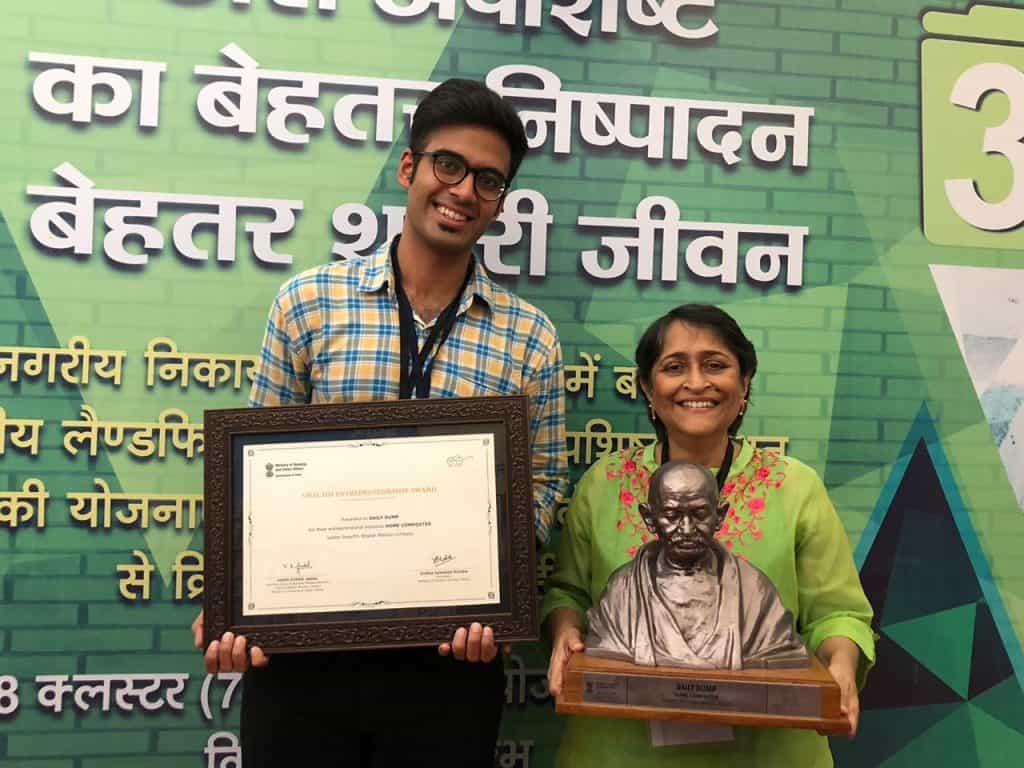Saahas and Daily Dump, two well known initiatives in the waste management space in Bengaluru were recently recognised for their work. Saahas was awarded the Swachh Best Practice Award by Swachh Bharat Mission and Daily Dump the Swachh Entrepreneur Award.
Prime Minister Narendra Modi conferred the awards and released the Swachh Survekshan 2018 Report and launched the Swachh Survekshan – 2018 Results Dashboard, accessible here. More details of the award can be read here.
The following note has been shared by the Saahas team.
Swachh Bharat Mission (Urban) has selected Saahas Zero Waste, a Bengaluru based startup, to receive the Swachh Best Practice Award for our Zero Waste program for Bulk Generators. The award was presented by Prime Minister Narendra Modi at the Nehru Stadium, Indore, Madhya Pradesh on June 23, 2018.
Saahas Zero Waste is a socio-environmental enterprise that believes in a circular economy, where all waste is converted to resources. In this context, we provide decentralised waste management solutions to our clients including onsite management of wet waste and onward transportation of other categories of waste to authorised end destinations.
Saahas assists producers in complying with their extended producer responsibility with respect to plastic and e-waste by developing and implementing reverse logistics. Finally, to close the loop, Saahas offers products such as stationary items, backpacks, roofing sheets and chipboard, made from certain types of waste.
[embeddoc url=”https://citizenmatters.in/wp-content/uploads/2018/07/Saahas-Zero-Waste-Profile_2018.pdf” download=”all”]
Through these business verticals, Saahas handles over 35 tons of waste per day across south India and offer dignified livelihoods to approximately 250 field staff (80% women).
Helping bulk generators in Zero Waste Program
The Solid Waste Management Rules 2016 have defined Bulk Generators as entities generating 100 kgs or more of solid waste per day or having more than 5000 sqm area. All Bulk Generators are expected to segregate their waste at source and to ensure that all their waste is processed by authorised end destinations.
Through our Zero Waste Program, Saahas offers decentralised end-to-end waste management systems to bulk generators across Bangalore and Chennai. Starting with a waste audit, they measure the quantities and types of waste generated and design appropriate solutions for handling and management of such waste in accordance with applicable regulations.
Then, 1) a segregation system is introduced at the client premises where different waste streams are kept segregated, 2) collection systems are introduced for various streams of waste, 3) wet waste is processed onsite to the extent space available; and 4) different waste streams are identified and transported to relevant end destinations (such as biomethanation units, recyclers and co-processing units) for processing of such wastes. Saahas also conducts training and awareness sessions on reduction of waste, segregation at source and other best practices relating to waste management.
By working with Saahas, some of the clients are able to reduce the amount of waste going to landfill from around 40-60% to approximately 10% in a span of one year.
Daily Dump wins Swachh Entrepreneur award
The following note was shared by the Daily Dump team:
Daily Dump was awarded the Swachh Entrepreneur Award for its home composting units as a part of Swachh Survekshan – 2018. The award included a bust of Mahatma Gandhi and a certificate.

The award validates Daily Dump’s belief that they need to engage continuously to get more people to compost organic waste at source. Daily Dump, a brand of PBK Waste Solutions Pvt Ltd, has pioneered home composting in the country since 2006 when we first introduced our terracotta home composter – the Kambha – in the market.
As of May 2018, Daily Dump has customers who together keep about 42,068 kgs organic waste out of landfill daily, without any cost to the government.
Note: This article has been prepared based on press notes shared by Vishal Kumar of Saahas and Vinita S of Daily Dump.